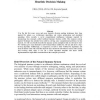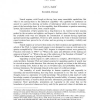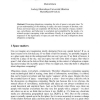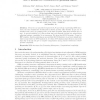144 search results - page 4 / 29 » What Can AI Get from Neuroscience |
CORR
2008
Springer
13 years 8 months ago
2008
Springer
Over the last few years, more and more heuristic decision making techniques have been inspired by nature, e.g. evolutionary algorithms, ant colony optimisation and simulated annea...
AWIC
2003
Springer
14 years 1 months ago
2003
Springer
Abstract Search engines, with Google at the top, have many remarkable capabilities. But what is not among them is the deduction capability—the capability to synthesize an answer ...
GI
2007
Springer
14 years 12 days ago
2007
Springer
: Discussing ubiquitous computing, the role of space is not quite clear. To get an understanding of the thinking on space, the main concepts of absolute, relational, and social spa...
ICAIL
2005
ACM
14 years 2 months ago
2005
ACM
The transcripts of oral arguments before the US Supreme Court provide interesting opportunities from the viewpoint of legal education. As the pinnacle of legal argumentation, they...
ICCS
2005
Springer
14 years 2 months ago
2005
Springer
Abstract. Given two arc-annotated sequences (S, P) and (T, Q) representing RNA structures, the Arc-Preserving Subsequence (APS) problem asks whether (T, Q) can be obtained from (S,...




